Tags
atomic bomb, Doomsday Clock, epic, faith, Hendrik van Loon, Hollywood, hope, hydrogen bomb, Irwin Allen, The Spirit of Man, The Story of Mankind, Vincent Price
“History is the mighty Tower of Experience, which Time has built amidst the endless fields of bygone ages. It is no easy task to reach the top of this ancient structure and get the benefit of the full view. There is no elevator, but young feet are strong and it can be done.” ~ Hendrik van Loon (forward from “The Story of Mankind”)
Would it surprise you to learn that Vincent Price once portrayed the Devil in a film? Probably not, I’m sure. After all, the Master of the Macabre forever endeared himself to us all by playing such devious characters as Roderick Usher in “House of Usher”; sadistic witch hunter Matthew Hopkins in “The Conqueror Worm“; and my personal favourite, the charming Frederick Loren in “The House on Haunted Hill“.
But when distinguished actor Vincent Price took on the role of the impeccably dressed, silver-tongued, debonair Devil himself in 1957, it was for a very different kind of picture.
Irwin Allen’s “The Story of Mankind” is based on the classic children’s book written by Hendrik Van Loon in 1921, and is a film unlike any other film I’ve ever seen. It was released November 8, 1957, and it boasts an impressive cast of Hollywood talent, or as this poster advertises, “The Biggest Star Cast Ever On One Screen!”.
But what I found most incredible about the movie is how relevant its theme, questions, fears and warnings are right now, today, in 2017.
This film poses this simple yet disturbing question: Should Mankind be allowed to survive? Is it inherently good? Or at its core, is it so evil that it should be left to destroy itself?
Down through the ages, Mankind has been responsible for some of the most atrocious of evil deeds. Waging wars, spilling blood; the thirst for conquest and power never satiated. The 1940s saw the invention of the atomic bomb. But the 1950s ushered in a new, more terrifying and more deadly discovery — the hydrogen bomb, referred to in this film as the “Super H. Bomb”.
Now Mankind sits on the verge of his own apocalyptic destruction. A celestial panel of judge and jury have assembled, a high tribunal of sorts, to discuss this pressing matter. Is Mankind worth saving?
And who is the executioner in this story, you might ask? Why, Mankind himself.
Vincent Price plays the Devil, referred to throughout the film as “Mr. Scratch”. He, along with Ronald Colman as The Spirit of Man (pictured above), spend the next 100 minutes taking us on an exhaustive and thorough exploration of the history of Mankind.
The film has a definite Cecil B. DeMille vibe to it. And quite frankly, I would happily place it right alongside some of Hollywood’s greatest epics, like “The Ten Commandments” and “Ben-Hur”. I might even go so far as to say it’s better than those, because “The Story of Mankind” is an exercise so deeply intellectual, firmly rooted in morality and logical querying, that you will be thinking about the implications of its message long after the end credits roll.
Visually, it’s not the most expensive or spectacular production in the world, though they clearly put in a lot of effort and the sets do look very good. Nor is the acting anything noteworthy. In fact, the film takes such an over-the-top theatrical approach at times, that despite the star-studded cast, the acting is really quite atrocious in a few parts.
Agnes Moorehead as Queen Elizabeth I and Hedy Lamarr as Joan of Arc are the worst offenders. I’ve seen both of these women in other acting roles and I know they are each very good. So I’m not entirely sure what happened here, but it was quite a disappointment to see sub-par acting in such a remarkable film.
However, Vincent Price delivers what is, quite possibly, his greatest performance ever. And I say that as someone who has seen most of his oeuvre; not just the hits, but also some pretty obscure (and pretty terrible) works like the 1962 film “Confessions of An Opium Eater”, and a guest role on the Snow White episode of Faerie Tale Theatre as the Evil Queen’s magic mirror.
He plays Mr. Scratch flawlessly. If the Devil were to manifest himself in physical form, I’m convinced that this is what he would look and sound like. No matter what the script, bad or good, Price gives it 110%, always laser-focused on doing the best possible job he can. And “The Story of Mankind” is one of those rare times the material was befitting the actor. I’m going to do a lot of quoting from this film because the dialogue is simply superb.
• The Dilemma •
The film opens with two unseen angels discussing Mankind’s discovery of the Super H. Bomb. “They’re not ready or wise enough to handle it yet. If exploded now, the bomb would blow man and his earth sky high. No one would be left alive.”
And so ensues a galactic trial, with “The Spirit of Man” making a case for Mankind’s survival, and Mr. Scratch presenting evidence for its swift demise.
Mankind’s representative is described as “A combination of all men. The pious and the fallen; the bold and the meek; the dreamers and the builders; the chaste and the guilty; the great and the small men of all times”.
Mr. Scratch enters the scene in a cloud of red smoke and waving a pitchfork — a devilishly symbolic nod to his identity as Satan. He also introduces himself as the inventor of the Super H. Bomb.
While the film’s subject is a very serious one, and its intention is never in doubt, it is also heavily laden with comic relief. The humour is typically provided by the inimitable Mr. Price and often includes the mute Devil’s apprentice played by Nick Cravat — totally unrecognizable, I’m sure, to Twilight Zone fans in the absence of his gremlin suit.
Mr. Scratch and The Spirit of Man are permitted to visit Earth during any period of time since the world began, and then present as evidence to the court, the people and events which prove Man’s worthiness or reveal his inadequacy.
• The Evidence •
Man was created in the image of God. But there the similarity ends. Mortal, not immortal are we; of the flesh, not of the spirit are we; human, not God-like are we. But whatever our sins, whatever our shortcomings, we believe the good deeds done by man on earth far outweigh the bad, thereby earning him the right to survive.
~ The Spirit of Mankind
The journey begins in the Garden of Eden, and then touches on man’s discovery of fire. During this excursion, The Spirit of Man points to man’s ability to reason and learn, and his thirst for knowledge and growth — all positive qualities.
But he is quickly challenged by Mr. Scratch who introduces the Pharaoh Khufu (played by John Carradine), builder of the Great Pyramid of Giza.
Mr. Scratch uses Khufu as his first example of Mankind’s evil. In exchange for the promise of immortality, Khufu pledged the souls of a million men to the Devil. His tyranny, bloodlust and greed are legendary — the Pharaoh who truly thought of himself as a god on earth.
The Spirit of Man counters that the evil action of one man cannot be grounds for the condemnation of all men.
But Scratch begs to differ. “Man himself is to blame for his stupidity in worshiping villains as if they were heroes. The individual villain is only a symbol for the villainy of all Mankind.”
The Spirit of Man then directs our attention to Moses — the righteous man of God who set God’s people free from slavery. He too was born in Egypt, and was even raised in the house of a Pharaoh. Yet the path he chose could not have been more different than that of Khufu.
“Man’s inherent goodness is strong enough to rise above the bad even if both are born in the same place.” Touché, Spirit of Man.
As the film works its way forward in history, the two men are locked in a battle of wits, each presenting strong and valid evidence both for and against Mankind.
We visit the Trojan War and are reminded of Helen — the face that launched a thousand ships; Hippocrates and the beginnings of modern medicine; and Cleopatra, the power-hungry princess who killed her brother to take the throne, then manipulated men like Caesar and Mark Antony for her own gains.
Mr. Scratch introduces us to a bevy of villains: Roman Emperor Nero (Peter Lorre), remembered for his debauchery, depravity and violence. As well as Attila the Hun, and Spanish Conquistador Hernando Cortez, a man responsible for wiping the entire Aztec nation off the face of the earth.
Meanwhile, the Spirit of Man cites French heroine Joan of Arc, a segment that was beautifully crafted, but very poorly executed by Hedy Lamarr, as mentioned above.
We’re also shown the studio of Leonardo Da Vinci, filled with beauty and art; the settling of the New World by people full of hope and strength of spirit; and the inventions of Thomas Edison — all people who were a positive influence on humanity, and positive examples of decent men and women in history.
But herein lies the problem, and this is, in my opinion, the reason that even at the time this film was produced, few seemed to like it. In fact, “The Story of Mankind” made it into a “50 Worst Films Of All Time” list compiled in 1978.
The examples of Mankind’s penchant for cruelty and evil far outweigh the figures who display purity and altruism. So the film provides a compelling and irrefutable argument… against Mankind.
No one can disagree with Mr. Scratch’s portrait of a less-than-benevolent, undeserving humanity which includes such blights on our history as the Salem witch trials, the American Revolution, the French Revolution, Napoleon, the extermination and mistreatment of the North American Indians, the American Civil War, WWI, Adolf Hitler, and finally the creation of the atomic bomb.
He’s even able to turn the Spirit of Man’s own witnesses against him, pointing to Leonardo’s war machines, and how those benevolent settlers drove the Natives from their land and cheated them with worthless trinkets and baubles.
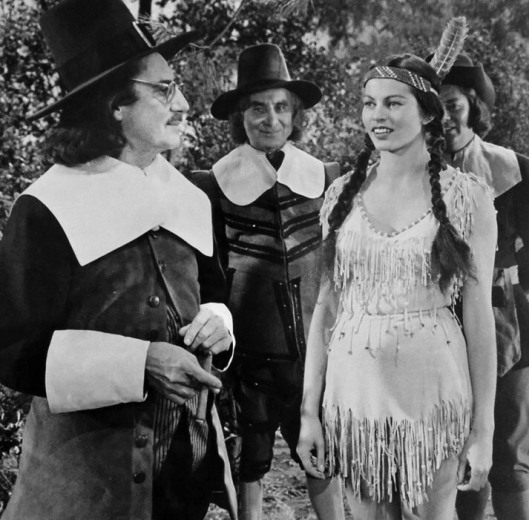
Groucho Marx as Peter Minuit, the Dutch colonial governor who purchased Manhattan Island from the Indians for approximately $25 worth of useless goods
Watching the movie, I even found myself saying, “Damn, he’s right. What an appalling legacy we have left behind, and — more disturbing — continue to perpetuate.”
This whole film is a wake-up call, and I think that was exactly the point Irwin Allen and all the celebrities involved wanted to make. Many critics wonder how such a “mediocre” film garnered so much star power support — THIS is why. It’s very much a silver screen public service announcement meant for the entire world.
The subject matter hits very close to home, and confronts the viewer with unsavoury yet irrefutable evidence which proves that we aren’t as progressive and civilized as we think ourselves to be. And no one likes having their shortcomings and mistakes paraded right in front of them.
It may not be fun to face the facts, but it is necessary if we’re ever going to change anything. We must learn from our mistakes, not continually repeat them. And for that reason, I think this film is truly one of the greatest offerings of cinematic history, and deserves to be remembered as an important and critical narrative on the human condition.
• Closing Arguments: Is There Any Hope for Us? •
With their historical time-travelling expedition complete, the Spirit of Man addresses the court. The dialogue here is absolute literary perfection, so I’ve transcribed the scene.
“Many words have been spoken at this tribunal, some of them angry, some of them in milder temper. But whatever the words, I do sincerely believe that down through the ages, the soul of man, mislead many times, has survived the deceit of the few, and managed to redirect itself through inherent moral strength.”
“My colleague, Mr. Scratch, has maligned and blackened all of Mankind for all of time. He does his job well, but that is because it is, with him, a full-time job, and over a period of a million years he has become quite adept at developing man’s weaknesses.
Yet, man recovers! And emerges stronger, more capable than ever. Now, all the facts have been presented, and whatever colouring my opponent has chosen to give them, I am certain you have seen their true worth and weighed them accordingly.
However, one point has been overlooked. One witness not called. And with your permission, I raise that point and call that witness now, in place of the usual summation.”
Judge: “This procedure is most unusual.”
Spirit of Man: “But this case is most unusual! And since it carries a decision to affect all eternity, it does not seem unreasonable to beg your indulgence on this one point.”
The court obliges.
Spirit of Man: “And now I call your attention to my last witness, the Man of Tomorrow [a child]. If there is no tomorrow, and no men of tomorrow, all the yesterdays will have had no meaning. All the sacrifice, faith and progress since man first appeared on earth will go unrewarded, and the world of evil presided over by the Devil himself, will have been victorious. If goodness be its own reward, let there be a tomorrow on the planet Earth.”
Before Mr. Scratch is allowed to present his closing argument, the judge makes an announcement.
“I have just received word that the warring armies have moved against each other on the planet Earth. In accordance with the destiny of time, the great Super H. Bomb will explode at exactly 11:00. I direct your attention to the Great Clock of Outer Space.”
“When the clock strikes 11, the bomb will go off and bring an end to Mankind, unless as such decisions are entrusted to us, we decide that the bomb shall not go off, that Mankind shall survive. Therefore, speak quickly, Mr. Scratch, and make your summations brief. For we must make a decision before the clock strikes 11.”
Mr. Scratch takes the floor: “My distinguished colleague rests his entire case on the so-called Man of Tomorrow. By inference he almost acknowledges that Mankind deserves no better end than annihilation by the Super H. Bomb. And yet weak and sentimental, as is all Mankind, he introduces a sentimental trick, and hopes to gain the mercy of the court by introducing a pathetic last witness — a child. I accept the challenge, and I shall use as my final summation the very witness brought here by Man.
I call your attention to the witness, innocently playing with his toys. This is Mankind’s bright hope of tomorrow. The hope of peace and virtue. Have you seen the toys with which the child plays? A toy gun and a toy sword!”
The Spirit of Man interrupts. “I ask that the toys of the child be more carefully examined. The gun fires nothing more dangerous than music. And the toy sword is nothing but a pencil box.”
And then finally, the moment I was hoping would eventually come.
“If it please the court, there is one piece of evidence already referred to which has not been placed on exhibition. The Bible. I ask that it now be marked as an exhibit.”
To which Mr. Scratch vehemently objects, but the court allows it.
Spirit of Man: “First, there is a line to be read.”
Mr. Scratch: “Objection! That book has no place in this trial! And no bearing on its outcome!” The court overrules Mr. Scratch.
Spirit of Man: “‘The wicked worketh a deceitful work: but to him that soweth righteousness shall be a sure reward.’ My lords, I rest my case.”
This is Proverbs 11:18 that The Spirit of Man is quoting. And the look on the Devil’s face — pure and utter defeat — is priceless.
• The Verdict •
We now see that the clock is mere moments away from 11:00.
The court confers as the time quickly winds down, and finally announce their verdict.
“In the matter of the story of Mankind, this high tribunal has weighed most carefully the good of man against his evil. And finds that man is as evil as he is good. His holiness has been equaled by his tyranny. His nobility by his lack of faith. So the scales balance much too evenly for this high tribunal to determine whether to bring an end to Mankind or to assure him eternal life. We therefore reserve judgement in order to allow Man more time to set his house in order at the earliest possible date.”
“Take heed and listen well. Time runs swiftly, and the fate of Man is now laid at the doorstep of Man himself. By the villains you encourage, by the heroes you create, you shall soon achieve eternal life or oblivion. Therefore, it is the decision of the High Tribunal of Outer Space, this court shall soon convene again to determine finally whether Mankind shall continue, or be destroyed by the Super H. Bomb.”
And then the judge turns and looks directly into the camera.
“This choice is entirely up to you.”
• Reflection: Did We Heed the Warning? •
Such a haunting, poignant narrative. But what really took me off guard was that as the judge delivered that final line, I suddenly thought back to a very specific detail from the beginning of the film. One that didn’t register when I first heard it.
When the tribunal is first convening, the judge explains why they’ve all gathered.
“And whereas the creature man, on the planet earth, has uncovered the secret of the Super H. Bomb 60 years before he was scheduled to do so…”
60 years.
“The Story of Mankind” was made in 1957. Here we are now in 2017… 60 years later.
Now, I’m not suggesting there’s anything mystical about that. But it did seem especially apropos that I was experiencing this amazing film exactly 60 years after its creation, when it specifically makes reference to 60 years in the future.
It’s kind of like opening a time capsule. And what I discovered inside is that in the absence of God, man is destined to repeat history and destroy himself. Despite warnings. Despite being brought to the brink of destruction countless times. Our own history tells the story. We make mistakes. We say we’ve learned. Then we make them again. And again. And again.
It’s no wonder so many take a very pessimistic outlook on human life. Everything Mr. Scratch said was true! Humanity WAS responsible for so many of its own tragic events. And we DO enable the villain, and often herald him a hero. And no matter how many times we’re faced with the dire consequences of our actions, we’re just too stubborn and self-serving to listen.
Referring to the greatest commandment, Mark 12:30 says, “Love the Lord your God with all your heart and with all your soul and with all your mind and with all your strength.’ The second is this: ‘Love your neighbor as yourself.’ There is no commandment greater than these.”
God is Truth and Love. In the absence of Truth, nothing can exist. In the absence of Love, nothing can be created. I’m a Christian, so I recognize God as Truth and Love in physical form — His name is Jesus. But even someone who doesn’t share my belief in Jesus can’t refute that if there is a God, He is Truth and Love, because you need Truth AND Love to create anything.
If we want to build a table, we need two things. 1) The knowledge to know what materials we need to make one, and the wisdom to know how to put it together. And 2) The desire to build it. If we start building the table and you hate tables, are we ever going to get it finished? No, because you’re going to keep smashing it as we go. Now apply this to all things. Truth and Love. The opposite is falsehood and hatred — the Devil. Can he create anything? Absolutely NOT. He only destroys. Only Truth in a spirit of Love can create.
And as long as we reject the truth of that, all we will find is destruction. The command says to love your neighbour as yourself. Don’t do to anyone else what you wouldn’t appreciate having done to you. When I look around the world, whether it be the world of 2017 or the world of 1957, or the world of 4000 years ago, I see many, many people who do a lot of horrible things that they wouldn’t like having done to them.
Every Pharaoh, every Emperor, every King and Queen has wanted to play God over others. Every war has stemmed from people not willing to compromise and love each other. Every revolt has been caused by one group’s perceived mistreatment by another. Even within Christendom itself we find violent division. And over what? Traditions and rituals. Things that don’t even matter when you claim to serve the same God.
And no matter how many times it happens, regardless of how many different ways our ancestors have illustrated it, here we are, still deep in the thick of a war-torn world. Wars are not just fought on the physical battlefield against other people. We fight them every day within ourselves. We ask (or SHOULD ask) ourselves, “Would I want someone else doing/saying this to me?” We consider (or SHOULD consider) how our actions and choices will impact those around us. But time and again we fail.
So is there any hope for us? Rod Serling certainly thought so. Many episodes of The Twilight Zone dealt with the very situations portrayed in “The Story of Mankind”. And much like the Spirit of Man does in this film, Serling always points to that note of hope. Hope that we could do better. That we can be better. That we aren’t slaves to some unchangeable predestined end, manufactured by the villains among us.
And it was finally here that I saw the true beauty of this film. I spent 5 months trying to reconcile the fact that I didn’t agree with the Spirit of Man’s assessment of humankind, or with the tribunal’s decision to save Mankind. But then I watched the movie again, and I paid special attention to that Bible verse at the end.
The first time I watched it, I was puzzled why they chose Proverbs 11:18 as the passage to prove Mankind’s worth. Surely there were better verses. But when it comes to the Bible, I always caution people to never read just one verse. And that made me wonder what ELSE Proverbs 11 says. When I read the verses around it… I finally understood.
“The wicked man earns deceptive wages, but he who sows righteousness reaps a sure reward. The truly righteous man attains life, but he who pursues evil goes to his death. The LORD detests men of perverse heart but He delights in those whose ways are blameless. Be sure of this: The wicked will not go unpunished, but those who are righteous will go free.”
I wish this entire passage had been included in the film. That’s verses 18-21 instead of 18 alone. Because now it makes sense.
The Spirit of Man said one thing earlier that was incorrect. He said that man was made in God’s image and that’s where the similarities end. But the Bible says that we were made in God’s image, likeness and form. Image referring to the mind — our ability to follow Truth or falsehood. Likeness meaning the desire or heart — our choice to love or to hate. And form meaning a physical body for our mind and heart to dwell in.
We have choice. And all through this film we see people making choices to love or to hate, to follow Truth or follow falsehood. In one poignant scene, we see a family hiding from Roman soldiers. They’re huddled in front of a cross and are praying in secret, knowing that if they are discovered, they’ll be killed.
The man clutches his boy and trembles with fear.
“It’s Nero’s soldiers coming for us. We must flee!”
But his wife tries to calm him.
“Did the Master flee when they came to take Him to the hill called Golgatha?”
“But if we die, the Master’s words die with us!”
“The words will live on, surviving the flames of martyrdom till peace and faith and love shall rule the earth.”
“They’re here, we must pray for help!”
“No, rather let us give thanks, for the Master also said ‘blessed are they who are persecuted for righteousness sake, for theirs is the kingdom of heaven’.”
This is why there’s hope. This is why Mankind deserves to survive. Because yes, there will always be the villains who lead people astray. But the Spirit of Man was right — you can’t condemn one for the actions of another. We each make our OWN choices. We answer for ourselves. How we act, what we do, how we treat other people… our fate is in our own hands. And as long as there are people who choose to do the right thing? To persevere in the face of adversity? To fight against wickedness and evil? Then they deserve a chance. They don’t deserve to be condemned along with the wicked. And that’s why Proverbs 11 was chosen for this film — they won’t be.
As the passage says, the wicked will be punished, but the righteous will be saved. “The wicked worketh a deceitful work: but to him that soweth righteousness shall be a sure reward.”
There are things in this life which are far more destructive and dangerous than a hydrogen bomb. And I believe that this is what “The Story of Mankind” was trying to show us. The evils which prey on Man are the same today as they were yesterday. The battle is ongoing, and at times, victory seems completely unattainable.
Yet where there is still faith, there is love. And where there is love, there is hope. And where there is hope, there is perseverance. Where there is perseverance, there is victory. And where there is victory, there is salvation.
The evils of the wicked will not condemn the righteous as long as the righteous stand firm.
But the choice is ours and ours alone.
Sadly, “The Story of Mankind” has been removed from YouTube, so I’ve deleted the links from this post. However… I’m happy to say that you can watch the full film at Archive.org! I highly recommend it. Obviously!
The Story of Mankind Full Movie
Update: March 2018: Movie Movie Blog Blog and The Midnite Drive-In are co-hosting one of the more interesting blogathons I’ve seen — The End of the World Blogathon! Steve was kind enough to let me participate with this previously-published post (thank you, Steve!). The blogathon runs from March 30 to April 1. Click the badge above to check out all the other entries. It’s the end of the world as we know it… or is it…?



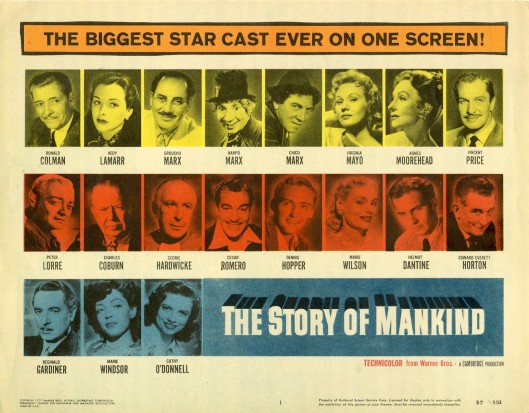





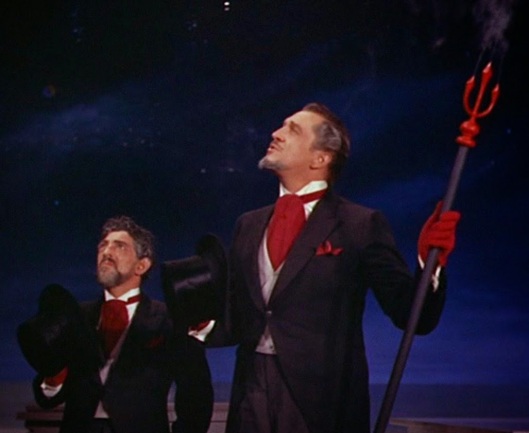
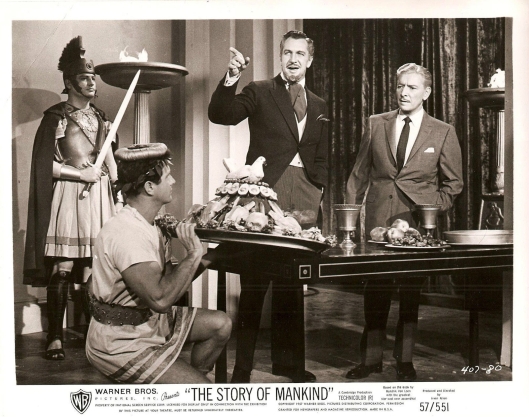



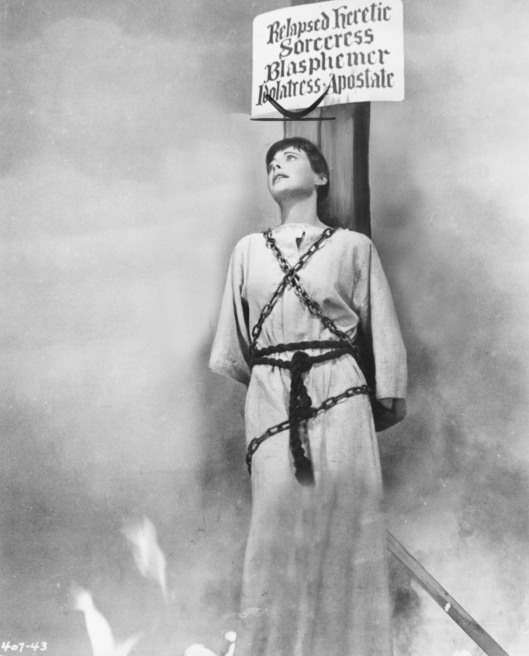
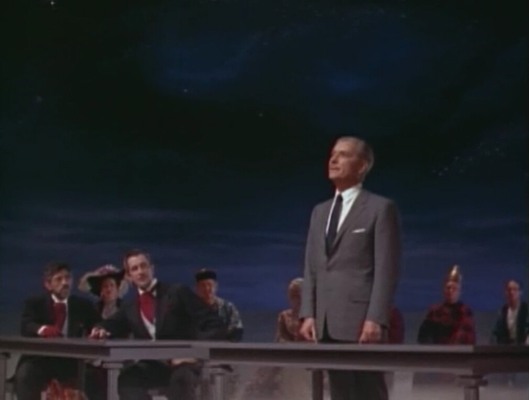

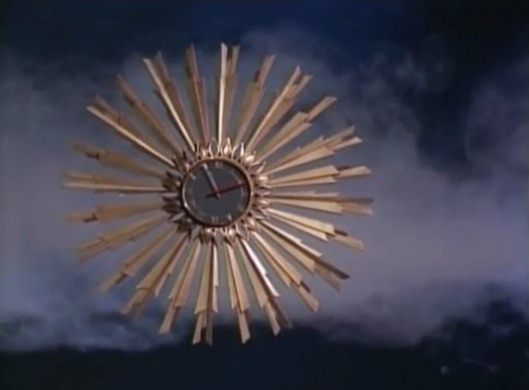


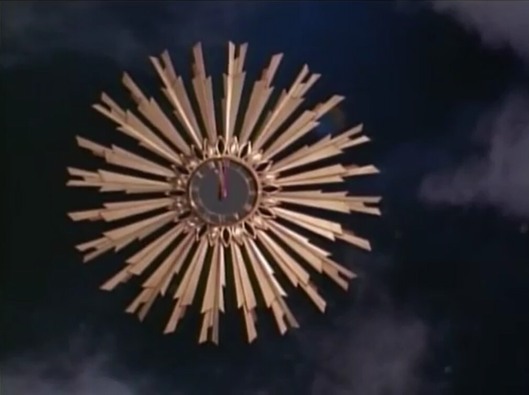


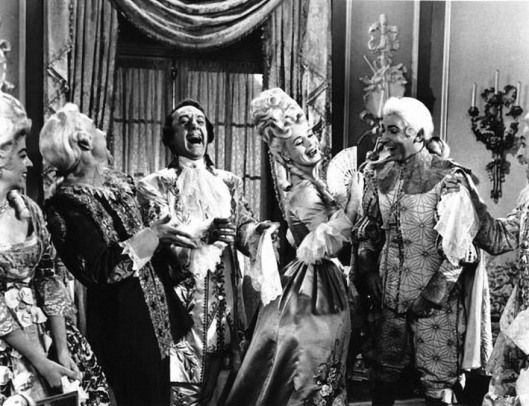



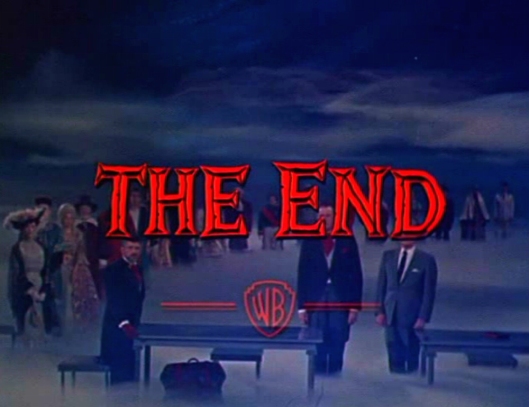

This is an impressive review, Wendy. Considering the cast, I’m surprised I’ve never seen this movie! But you can bet I’ll check it out.
Oh, I hope you do, and that you’ll enjoy it as much as I did!
I have never seen this movie. I was barely 3 when it was released, and i guess it wasn’t replayed a lot. Still, I would have been optimistic given Price and the Marx Brothers bring in it I’ll have to check it out.
No, I don’t think this beautiful film graced many screens in the last 60 years, sadly. If you do get to see it, I would certainly be interested in what you think of it. But it is WELL worth watching.
Took me a while to get through all this! Thought-provoking post and movie! I think I’ve heard of it, but have never seen it…would like to….
Goodness, I know — it’s a VERY long post. But I feel like if you’re going to write, you should write what you feel needs to be written. I never want to get into the habit of writing for likes and comments and praise. To me, that’s not what writing is about. It’s NICE, sure! But I like to write about what’s important to me, and to do the subject full justice. Sometimes that means writing 4000+ words, unfortunately! :PP I didn’t have much hope that anyone was going to stick with it and actually read right to the end, but I hope that someone did, as I certainly put a lot of time and thought into writing it.
Even though I’ve given my conclusions a very Christian spin here, I’m confident that even those of other convictions would appreciate this film very much. It reminded me of episodes of The Twilight Zone like “The Shelter”. Just the tone of it being an illustrated warning for mankind to be vigilant and to pay attention to what we’re doing and how we treat each other. The film came at a very scary time in human history, and was a pretty impressive cry against war and death.
And I really did want to bring awareness to a long forgotten film that is truly a Hollywood treasure. So I hope you will get to see it!
I does sound like a cool film! In fact I may have even caught the end of it recently and didn’t realize it. The movie I’d seen had a looong staircase and a setting just as you described. I don’t recall if Vincent Price was in it, which is weird…but I don’t! But would like to see this…I just don’t like watching movies on my computer…. :-[
In any event, yes, we all need to re-evaluate our actions in this life to make sure we are in keeping with what we give LIP SERVICE to, and make sure our thoughts and actions are indeed in-line with our stated intents. Great post, Wendy!
Hmm, there wasn’t any staircase in this film (that I can think of, anyway!), and Price is in pretty much every scene, so I feel like you definitely would have remembered seeing him — especially in his devil garb (he looks so fancy!). So I don’t think it’s the same film.
If you’re not fussy on watching à la computer, Amazon does have it on disc! https://www.amazon.com/Story-Mankind-Ronald-Colman/dp/B002TOL4DW/ref=sr_1_1?ie=UTF8&qid=1515365149&sr=8-1&keywords=the+story+of+mankind+dvd Though I’m perplexed as to why it’s so expensive. On the Canadian site, it’s $30! Which is why I have yet to own it. :P
Just cannot recall that movie…but it was pretty cool….
Pingback: Announcing THE END OF THE WORLD BLOGATHON! |
Nice take on the movie. I’ve never seen it, but your critique definitely whets my interest. The movie’s most memorable fact for Marx Bros. fans like myself is that Irwin Allen cast all three Marx Brothers and then didn’t have the sense to use them together in one scene. In any case, thanks for contributing to the blogathon!
I’m glad to hear it! I hope at least one person will go ahead and watch the film after reading my post because it really is worth watching if for no other reason than to see Vincent Price in all his glory. And you’re right — I was surprised to not see all three brothers in the same scene! Very much looking forward to the blogathon, and thanks again for letting me participate with this post. Also thank you for going ahead and adding the link to your site — I’ll be travelling on the 30th and was worried I might forget to comment with my link!
No problem! I’ve entered a few blogathons early myself, so I could do no less than return the favor.
Pingback: THE END OF THE WORLD BLOGATHON is here! |
When I get a chance this weekend I am going to look at that link. I love VP and have never heard of this one. I was also a history major in college so the historical aspects intrigue me.
Excellent! If you get the chance to watch it, I’d love to hear if you enjoyed it or not. I think with your knowledge of history, this film will prove to be even more interesting to you.
I enjoyed reading your fascinating and thoughtful review of this movie. I find the movie both equally fascinating and thoughtful. There is a certain silliness in the casting, but you can’t help but be drawn in by the dialogue and the arguments presented by the Price and Colman. Sadly, each generation must learn for itself anew what others have torturously experienced to achieve a modicum of knowledge. A valiant effort in filmmaking that may inspire those willing to give it a chance.
Thank you, Patricia! You make an excellent point — each generation DOES seem to need to learn for itself, unfortunately, despite how often history repeats itself. The film definitely has an air of silliness about it, but yes, the ideas being presented have great substance to them and provide the viewer with much food for thought. I wonder if the silliness and campiness was done deliberately in an effort to lighten the film and keep it from coming off as too heavy-handed? I personally wouldn’t have minded that, but I know it’s off-putting to a lot of people if they feel they’re being “preached” at about something.
Pingback: THE END OF THE WORLD BLOGATHON – Day 1 Recap |
You’ve persuaded me to give this film another chance. I started watching it a few years ago and, despite the fabulous cast, I couldn’t get into it. I think I was expecting too much from all that star power. But your post has provided much food for thought, and when I watch it again, I’ll concentrate more on the philosophical aspects – as you’ve outlined them here.
Your comment just made writing this post worth while. In the absence of my obsession with Vincent Price, I too would have potentially suffered from my eyes glazing over within the first few minutes of this film. In fact, I’ll be honest, without Price’s face, I doubt I would have ever even turned it on. But that’s exactly why I wanted to write about the film. I want people to give it a chance and to really pay attention to what’s being presented here.
I feel like there are probably a lot of films out there that get overlooked because on the surface they seem to lack a certain pizzazz. But wow, those sometimes turn out to be the best ones. Because they go beyond entertainment and provide you with many thoughts and ideas to mull over.
So if you can see this one through to the end, I don’t think you’ll be disappointed!
Pingback: Making the Unbelievable Believable: Vincent Price on Playing the Villain, Elizabethtown, KY, 1980 | Seeker of Truth
Pingback: “Santa Claus vs The Devil”: The Christmas Film You Don’t Want But OMG You Need It | Seeker of Truth